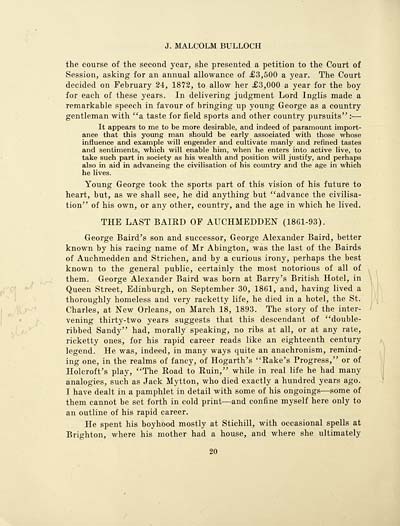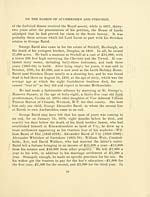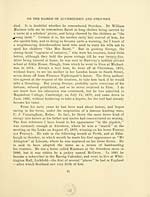Bairds of Auchmedden and Strichen, Aberdeenshire
(24) Page 20
Download files
Complete book:
Individual page:
Thumbnail gallery: Grid view | List view

J. MALCOLM BULLOCH
the course of the second year, she presented a petition to the Court of
Session, asking for an annual allowance of £3,500 a year. The Court
decided on February 24, 1872, to allow her £3,000 a year for the boy
for each of these years. In delivering judgment Lord Inglis made a
remarkable speech in favour of bringing up young George as a country
gentleman with "a, taste for field sports and other country pursuits" : —
It appears to me to be more desirable, and indeed of paramount import-
ance that this young man should be early associated with those whose
influence and example will engender and cultivate manly and refined tastes
and sentiments, which will enable him, when he enters into active live, to
take such part in society as his wealth and position will justify, and perhaps
also in aid in advancing the civilisation of his country and the age in which
he lives.
Young George took the sports part of this vision of his future to
heart, but, as we shall see, he did anything but "advance the civilisa-
tion" of his own, or any other, country, and the age in which he lived.
THE LAST BAIRD OF AUCHMEDDEN (1861-93).
George Baird's son and successor, George Alexander Baird, better
known by his racing name of Mr Abington, was the last of the Bairds
of Auchmedden and Strichen, and by a curious irony, perhaps the best
known to the general public, certainly the most notorious of all of
them. George Alexander Baird was born at Barry's British Hotel, in
Queen Street, Edinburgh, on September 30, 1861, and, having lived a
thoroughly homeless and very racketty life, he died in a hotel, the St.
Charles, at New Orleans, on March 18, 1893. The story of the inter-
vening thirty-two years suggests that this descendant of "double-
ribbed Sandy" had, morally speaking, no ribs at all, or at any rate,
ricketty ones, for his rapid career reads like an eighteenth century
legend. He was, indeed, in many ways quite an anachronism, remind-
ing one, in the realms of fancy, of Hogarth's "Rake's Progress," or of
Holcroft's play, "The Road to Ruin," while in real life he had many
analogies, such as Jack Mytton, who died exactly a hundred years ago.
I have dealt in a pamphlet in detail with some of his ongoings — some of
them cannot be set forth in cold print — and confine myself here only to
an outline of his rapid career.
He spent his boyhood mostly at Stichill, with occasional spells at
Brighton, where his mother had a house, and where she ultimately
20
the course of the second year, she presented a petition to the Court of
Session, asking for an annual allowance of £3,500 a year. The Court
decided on February 24, 1872, to allow her £3,000 a year for the boy
for each of these years. In delivering judgment Lord Inglis made a
remarkable speech in favour of bringing up young George as a country
gentleman with "a, taste for field sports and other country pursuits" : —
It appears to me to be more desirable, and indeed of paramount import-
ance that this young man should be early associated with those whose
influence and example will engender and cultivate manly and refined tastes
and sentiments, which will enable him, when he enters into active live, to
take such part in society as his wealth and position will justify, and perhaps
also in aid in advancing the civilisation of his country and the age in which
he lives.
Young George took the sports part of this vision of his future to
heart, but, as we shall see, he did anything but "advance the civilisa-
tion" of his own, or any other, country, and the age in which he lived.
THE LAST BAIRD OF AUCHMEDDEN (1861-93).
George Baird's son and successor, George Alexander Baird, better
known by his racing name of Mr Abington, was the last of the Bairds
of Auchmedden and Strichen, and by a curious irony, perhaps the best
known to the general public, certainly the most notorious of all of
them. George Alexander Baird was born at Barry's British Hotel, in
Queen Street, Edinburgh, on September 30, 1861, and, having lived a
thoroughly homeless and very racketty life, he died in a hotel, the St.
Charles, at New Orleans, on March 18, 1893. The story of the inter-
vening thirty-two years suggests that this descendant of "double-
ribbed Sandy" had, morally speaking, no ribs at all, or at any rate,
ricketty ones, for his rapid career reads like an eighteenth century
legend. He was, indeed, in many ways quite an anachronism, remind-
ing one, in the realms of fancy, of Hogarth's "Rake's Progress," or of
Holcroft's play, "The Road to Ruin," while in real life he had many
analogies, such as Jack Mytton, who died exactly a hundred years ago.
I have dealt in a pamphlet in detail with some of his ongoings — some of
them cannot be set forth in cold print — and confine myself here only to
an outline of his rapid career.
He spent his boyhood mostly at Stichill, with occasional spells at
Brighton, where his mother had a house, and where she ultimately
20
Set display mode to:
![]() Universal Viewer |
Universal Viewer | ![]() Mirador |
Large image | Transcription
Mirador |
Large image | Transcription
Images and transcriptions on this page, including medium image downloads, may be used under the Creative Commons Attribution 4.0 International Licence unless otherwise stated. ![]()
| Histories of Scottish families > Bairds of Auchmedden and Strichen, Aberdeenshire > (24) Page 20 |
|---|
| Permanent URL | https://digital.nls.uk/95616851 |
|---|
| Description | A selection of almost 400 printed items relating to the history of Scottish families, mostly dating from the 19th and early 20th centuries. Includes memoirs, genealogies and clan histories, with a few produced by emigrant families. The earliest family history goes back to AD 916. |
|---|

